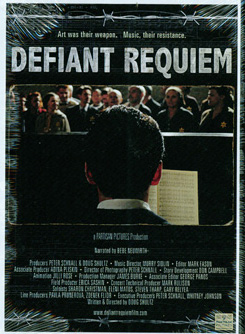By Eileen Wingard
 SAN DIEGO — For over a decade, the renowned American conductor, Murry Sidlin, has been consumed by his Defiant Requiem project. Sidlin strongly identified with the zealous conductor of Terezin, Raphael Schaechter, and wanted to bring to life the unique cultural resistance which took place in the Nazi show ghetto of Terezin. Through a performance of Verdi’s monumental Requiem, surrounded by dramatic dialogue, Sidlin successfully accomplished his goal.
SAN DIEGO — For over a decade, the renowned American conductor, Murry Sidlin, has been consumed by his Defiant Requiem project. Sidlin strongly identified with the zealous conductor of Terezin, Raphael Schaechter, and wanted to bring to life the unique cultural resistance which took place in the Nazi show ghetto of Terezin. Through a performance of Verdi’s monumental Requiem, surrounded by dramatic dialogue, Sidlin successfully accomplished his goal.
I attended the first performance of his Defiant Requiem in Portland, Oregon. Seated in a stark warehouse on non-cushioned bleachers, viewing the chorus dressed in the tattered garb of concentration camp inmates, we were transported. We felt viscerally the music’s great power to uplift and heal, imagining the passionate fervor of Terezin’s victims, letting their Nazi captors know of their forthcoming punishment and singing of the inmates’ own, ultimate liberation. Actors portrayed the courageous conductor, Rafi Schaechter and composers such as Victor Ulmann and Gideon Klein, who did not let the adverse conditions curtail their creativity.
The Portland performance was filmed, and I recall seeing it on Public Television. Since the Portland debut, Sidlin has been invited to reenact this Defiant Requiem production in many cities throughout this country and abroad. I last saw the rehearsal for it—the performance was sold out—at Washington, D.C.’s Kennedy Center in October 2010.
Now, a documentary has been made, also called, The Defiant Requiem, showcasing a performance of the Verdi Requiem at Terezin itself, under Sidlin’s direction, and chronicling the cultural life within the ghetto.
As in Sidlin’s original production, several survivors offer testament.
“Rehearsing with Rafi made us feel human. He gave us moments of pure joy,” said one survivor.
“Rafi put all of us into another world, not the world of the Nazis. This was our world,” said another.
When Schaechter was sent from Prague to Terezin, he took with him some sheet music, including the score of the Verdi Requiem. He taught all 150 of his chorus members the Latin text and the music by rote. It was performed 16 times, and Schaechter had to keep recruiting new participants because his choristers were constantly being deported to the death camps.
At the last performance, Adolph Eichmann, himself attended, as did members of the Red Cross. Eichmann is said to have quiped that the Jews were singing their own Requiem. From the inmates’ perspective, they were singing about Eichmann’s final demise.
Schaechter’s chorus, at their final performance, consisted of only 65 members because of last-minute deportations. By 1944, the entire chorus and Schaechter, himself, were sent to Auschwitz. He survived Auschwitz, only to die on a death march the following year.
One of the most touching moments in this remarkable documentary is when Sidlin takes the chorus into the dank cellar where Schaechter rehearsed. “This is sacred space,” Sidlin told the singers. When they began to sing, it was apparent, by the looks on their faces, how deeply moved each one was to be rehearsing in this same setting where the Terezin inmates themselves had been elevated to another plane and had felt their oppression lifted for a few hours.
“As hungry as I was, singing that music fed my soul, and that was most important,” commented a survivor.
The genius of Murry Sidlin, inspired by the genius of Raphael Schaechter, is showcased with dignity in this remarkable documentary, narrated by Bebe Neuwirth and written and directed by Doug Shultz. It is one of the most impressive documentaries about the Holocaust ever shown at the San Diego Jewish Film Festival.
At the single screening on Sunday, February 17 at 1:30 at the Clairmont Reading Theatres, there will be one person in the audience who actually rehearsed with the chorus under Raphael Schaechter in Terezin, 98-year-old Eve Wertheimer Gerstle of La Mesa. She was ordered to leave on a transport for Auschwitz before the first performance.
*
Wingard is a freelance writer and a retired violinist with the San Diego Symphony. She may be contacted via eileen.wingard@sdjewishworld.com